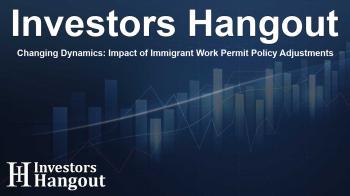Changing Dynamics: Impact of Immigrant Work Permit Policy Adjustments

Introduction to Policy Changes Affecting Immigrants
The recent decision by the government addresses the automatic extension regarding immigrant work permits. The termination of this extension is set to significantly affect numerous immigrants in various categories, including those connected to work visas and green card applicants.
New Regulations Implemented by the Department of Homeland Security
The Department of Homeland Security (DHS) has declared that the automatic 540-day extension of Employment Authorization Documents (EADs) for renewal applications will cease for all submissions made on or after a specified date in the future. This policy adjustment encompasses multiple categories of applicants, most notably H-4 visa holders and spouses of H-1B visa holders.
Details of the Employment Authorization Documents
This change indicates that current EAD holders who apply for renewals may no longer receive the automatic extension. Previously, these extensions allowed them to work legally while waiting for their application to be processed by the U.S. Citizenship and Immigration Services (USCIS). With this shift, individuals whose work permits terminate will be left in limbo without legal employment until a decision is made on their applications.
Revising Previous Administration Policies
The move represents a shift in policy from earlier guidelines which offered protections to immigrants awaiting decisions from USCIS. Under former regulations, there were safeguards in place that helped EAD holders continue their employment status without interruption.
Concerns Regarding National Security
The DHS has cited national security and thorough vetting processes as reasons for implementing this change. The focus is shifting towards ensuring that all immigrants are properly vetted before they are permitted to seek employment in the country.
Impact on the Workforce and Economic Consequences
This initiative by the government may lead to broader implications for the U.S. workforce, especially in light of ongoing concerns about a labor shortage. Some experts suggest that enforcement of stricter immigration policies could reduce the available workforce significantly, potentially hindering economic growth.
Statistical Forecasts on Workforce Reduction
Studies have projected that tightening immigrant work permits could lead to millions fewer workers in the U.S. labor market within the next decade, which may further complicate economic recovery efforts and stability. This could also lead to diminished goods and service production, posing a risk to overall fiscal health.
The Technology Sector and Immigration Policy
The ongoing tension over immigration policy is also especially critical for the technology sector, where many companies rely heavily on international talent. With new financial barriers for work visas, objections are rising regarding how these changes might deter foreign talent from joining U.S. enterprises.
Concerns from Industry Leaders
Renowned investors and experts emphasize that prohibitive fees associated with work visa applications could drive innovation and skilled labor overseas. This sentiment suggests a fear that essential tech companies may struggle to maintain their competitive edge without adequate access to global talent.
Conclusion: Adapting to New Regulations
As policies continue to evolve, both businesses and immigrant workers must stay informed and adapt to new regulations. The implications of these changes are monumental, affecting everything from individual livelihoods to the broader economic outlook. Stakeholders should remain vigilant and proactive in their approach to navigating these complex scenarios.
Frequently Asked Questions
What is the main change regarding immigrant work permits?
The U.S. is ending the automatic 540-day extension for immigrant work permits, impacting many visa holders and applicants.
Who will be affected by the new regulations?
H-4 visa holders, spouses of H-1B workers, and green card applicants are some of the groups that will feel the impact of this change.
Why is the government making these changes?
The government cites national security and the necessity for thorough vetting processes as primary reasons for these new regulations.
How might this affect the workforce in the U.S.?
Experts predict this could lead to a significant reduction in the U.S. workforce, potentially affecting economic growth negatively.
What industries are most at risk from these changes?
The technology sector, in particular, may face challenges due to reliance on skilled foreign workers who may be less inclined to come to the U.S. under stricter policies.
About The Author
Contact Dylan Bailey privately here. Or send an email with ATTN: Dylan Bailey as the subject to contact@investorshangout.com.
About Investors Hangout
Investors Hangout is a leading online stock forum for financial discussion and learning, offering a wide range of free tools and resources. It draws in traders of all levels, who exchange market knowledge, investigate trading tactics, and keep an eye on industry developments in real time. Featuring financial articles, stock message boards, quotes, charts, company profiles, and live news updates. Through cooperative learning and a wealth of informational resources, it helps users from novices creating their first portfolios to experts honing their techniques. Join Investors Hangout today: https://investorshangout.com/
The content of this article is based on factual, publicly available information and does not represent legal, financial, or investment advice. Investors Hangout does not offer financial advice, and the author is not a licensed financial advisor. Consult a qualified advisor before making any financial or investment decisions based on this article. This article should not be considered advice to purchase, sell, or hold any securities or other investments. If any of the material provided here is inaccurate, please contact us for corrections.

